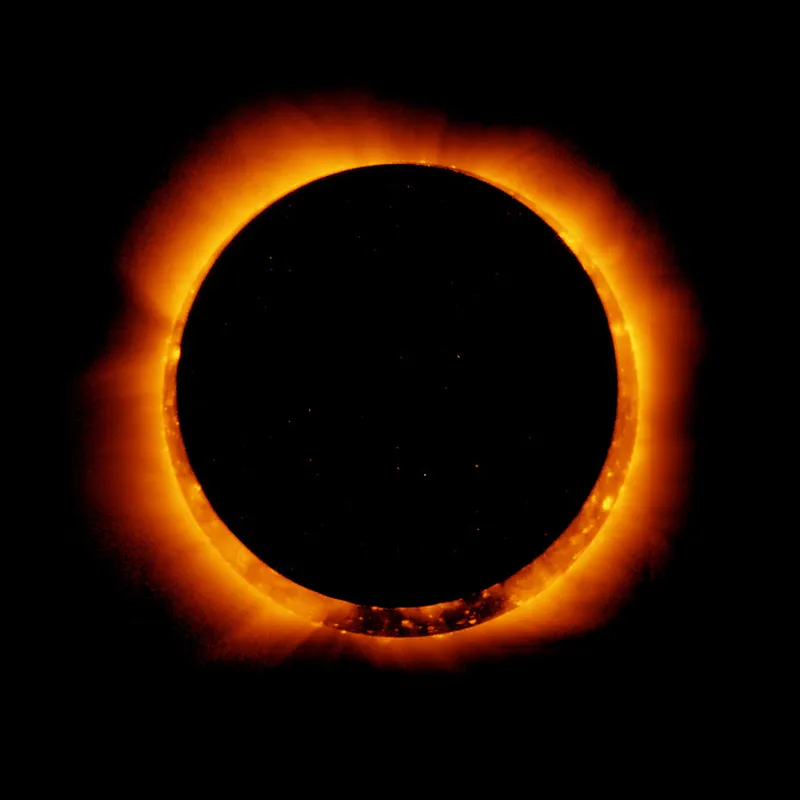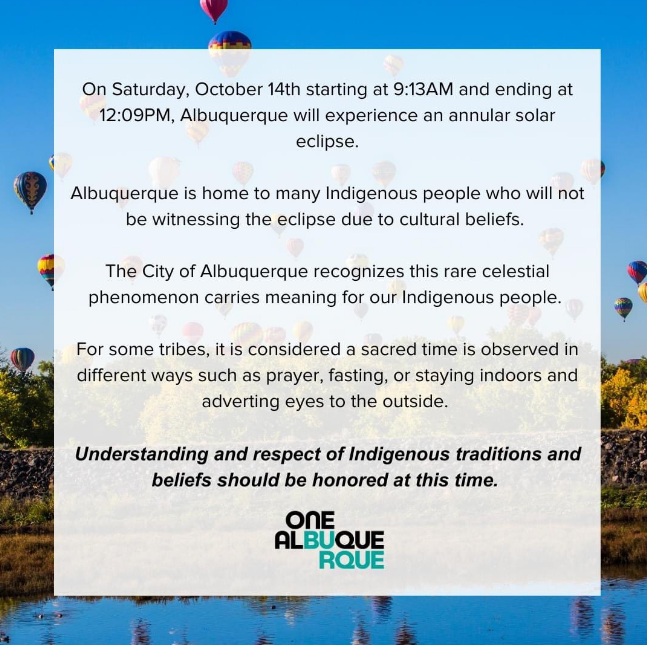
- Details
- By Levi Rickert
Weather permitting, millions of people in the United States will be able to witness a solar eclipse on Saturday. The eclipse that will occur on Saturday is called an “annular solar eclipse,” which happens when the moon passes in front of the sun. This eclipse will look like a ring of fire.
The U.S. space agency NASA says the path in the United States where the maximum views will occur on Saturday runs through portions of several states beginning at 9:13 am - PDT in Oregon, then California, Nevada, Utah, Arizona, New Mexico and Texas. People living in other parts of North America will be able to see less obscuring of the sun, but still impressive to see the eclipse.
Eclipses evoke different beliefs among Native American tribes. For instance, among the Navajo ( Diné), the eclipse is a powerful astronomical event that shouldn’t be viewed out of respect.
The Navajo Nation Parks and Recreation decided to close its Navajo tribal parks, including the Monument Valley and the Four Corners Monument, from 8 am - 1 pm out of respect of the solar eclipse. Louise Tsimijinnie, a media representative, told the Navajo Times the park’s closure is due to Diné tradition.
Tsinijinnie said as she was raised, she was taught to be respectful during a solar eclipse. She was taught that the eclipse is not for viewing nor something for Diné to see.
Ahead of the eclipse, the City of Albuquerque’s Indian Affairs released a statement recognizing Indigenous people will not be participating in public celebrations of eclipse.

Other tribes have similar beliefs about eclipses:
During eclipses, many Cherokees go outside and make noise to scare away the giant frog trying to eat the sun.
The Ho-Chunk in Wisconsin believes eclipses, both sun and moon eclipses, are to be respected because the time during eclipses is a time of transformation.
The Hopi in Arizona believe the time during an eclipse it a time to pray and a time for ceremony, such as a time to present traditional sacred names.
Regardless of your belief system, experts warn it is unsafe to look directly at an eclipse without some specialized eye protection due to the brightness of the sun. Without using a special-purpose solar filter when viewing an eclipse can cause severe eye injury, according to experts.
More Stories Like This
Native News Weekly (August 25, 2024): D.C. BriefsNavajo Nation Mourns the Passing of Former Vice President Rex Lee Jim
Deb Haaland Earns Endorsement From Communications Workers of America Local 7076
University Soccer Standout Leads by Example
Two Native Americans Named to Democratic Congressional Campaign Committee's“Red to Blue” Program
Help us defend tribal sovereignty.
At Native News Online, our mission is rooted in telling the stories that strengthen sovereignty and uplift Indigenous voices — not just at year’s end, but every single day.
Because of your generosity last year, we were able to keep our reporters on the ground in tribal communities, at national gatherings and in the halls of Congress — covering the issues that matter most to Indian Country: sovereignty, culture, education, health and economic opportunity.
That support sustained us through a tough year in 2025. Now, as we look to the year ahead, we need your help right now to ensure warrior journalism remains strong — reporting that defends tribal sovereignty, amplifies Native truth, and holds power accountable.
 The stakes couldn't be higher. Your support keeps Native voices heard, Native stories told and Native sovereignty defended.
The stakes couldn't be higher. Your support keeps Native voices heard, Native stories told and Native sovereignty defended.
Stand with Warrior Journalism today.
Levi Rickert (Potawatomi), Editor & Publisher


